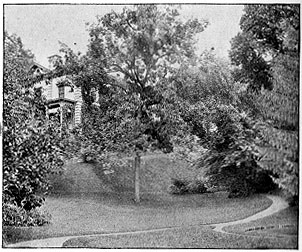Springfield, Massachusetts, by Clarence E. Blake, Ph.D., continued.
 Left: Home of the Late Samuel Bowles. Left: Home of the Late Samuel Bowles.
years enjoyed here the confidence and respect of all who knew him. After the war he visited his former master in Virginia, and finally removed to his old home to spend the remainder of his days. One negro woman was found by her master, but the good people of Springfield bought her freedom, and "Jennie" became one of the fixtures.
Timothy Dixon was a slave till the war. As the Union Army came his master said, "Well, Tim, I suppose you'll run away now. The Yankees are coming, and all the niggers are leaving. I wouldn't give much for you now." "No," said Tim, "I'll not run away to the Yankees; but if you will sell me my freedom, I'll go North and earn the money and pay you."
"Oh, no, you won't buy yourself when the Yankees are right over there, and you can go to them and be free."
"Yes, I will; tell me my price and I'll pay it." "Well,
you may be free for $200." So Tim drifted North to Springfield, and worked hard for the money, sending it by instalments. With much satisfaction he exhibits the receipt in full for the $200, which he might have saved.
John Brown, of Harper's Ferry fame, was at one time a resident of Springfield. He formed the Springfield branch of Gileadites, a secret order among the blacks of the United States to resist the capture of fugitive slaves. The late Judge Chapman was at one time United States commissioner. By virtue of his office, it was his duty to apprehend escaped slaves and see that they were returned. He was, also, a member of the Emigrant Aid Society. When pressed to reconcile the inconsistencies of his position, he said: "As an officer of the Emigration

Samuel Bowles.
-- Page 6 --
© Laurel O'Donnell 1998 - 2005, all rights reserved
This document may be downloaded for personal non-commerical use only
and should not be reproduced or distributed without permission.
|

 Left: Home of the Late Samuel Bowles.
Left: Home of the Late Samuel Bowles.